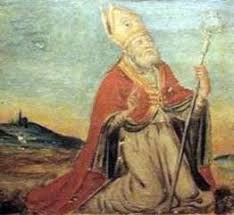Feast Day ~ February 19
 Although there are many stories of group and even mass baptisms both in holy Scripture and in the lives of the saints, the conversion of the Roman Empire and beyond to Christianity was, for the most part, not smooth sailing! There are many instances of areas which had become Christian falling back into pagan practices often with a change in the ruler of the area. Many Christian clergy and missionaries – including St. Paul himself – had to struggle constantly to maintain commitment and fidelity among those they had brought into the Church. St. Barbatus of Benevento is one who faced such a struggle in 7th century Italy.
Although there are many stories of group and even mass baptisms both in holy Scripture and in the lives of the saints, the conversion of the Roman Empire and beyond to Christianity was, for the most part, not smooth sailing! There are many instances of areas which had become Christian falling back into pagan practices often with a change in the ruler of the area. Many Christian clergy and missionaries – including St. Paul himself – had to struggle constantly to maintain commitment and fidelity among those they had brought into the Church. St. Barbatus of Benevento is one who faced such a struggle in 7th century Italy.
Born in a village in the duchy of Benevento (southern Italy) around the year 610, Barbatus was a devout child who received a Christian education and loved reading the Scriptures. All during his childhood his one desire was to be a priest, so as soon as he had reached the canonical age, the local bishop ordained him. It was discovered that Fr. Barbatus had a great gift for preaching, so the bishop gave him the task of preaching frequently and he eventually assigned him to be pastor of a village parish near the city of Benevento. Here, however, Fr. Barbato’s preaching skills were not so appreciated. The people were very nominal in their faith and were not at all pleased when the priest called them to repentance and amendment of life in his sermons. They rebelled, using every weapon at their disposal – particularly slander – to vent their sinful rage at their pastor. Eventually, Fr. Barbatus returned to Benevento where he was welcomed back.
But all was not entirely rosey in Benevento either. Although the inhabitants of the city had become Christian through the efforts of a disciple of St. Peter, there had been many changes in the centuries since then. The Goths had sacked the city in 545 and then it was overtaken by the Lombards, who were Arians. Although some citizens retained their Catholic beliefs, most had preserved some very strange pagan rituals which had been promoted by the ruler, Romuald. These rituals included bowing down to a golden viper and paying honor to a tree, upon which an animal skin was hung for archers to shoot at and then this ceremony was celebrated with public games. These holdovers from a pagan past required the strong preaching of Fr. Barbatus!
Once again, the people were resistant to change, enjoying their customs and superstitions without concern for their inconsistency with Christian faith. Only when another threat was made – one they considered more terrible and imminent than the idea of losing their souls to the devil – did the people turn to God in prayer and fasting and repentance. Emperor Constans II was bringing an army toward southern Italy for the purpose of overthrowing Lombard rule and with the possibility of the city of Benevento being sacked again. Fr. Barbatus warned about this possibility and the people finally listened. Events happened as he had foretold, but he also told of the end of the siege, which happened as he predicted.
With the people’s change of heart and the disaster over, Fr. Barbatus melted down the golden viper to make a chalice for the church, he chopped down the tree which had been such a source of sinfulness, and Christianity became strengthened in Benevento. When the bishop passed away in 663, Fr. Barbatus was consecrated to be the new bishop. He participated in a regional church council in Rome in 680 and in the Sixth Ecumenical Council in Constantinople in 681 which was called to refute the Monothelite heresy. St. Barbatus died shortly after the end of this Council in 682 at about 70 years of age, having spent his life arduously working to bring his people to authentic Christian faith and practice.
Once again, entire nations and regions which had been faithfully Christian for centuries are now slipping rapidly backward through the retention or reinstatement of pagan practices, from seemingly innocent customs (such as hanging mistletoe at Christmas) to our current barbaric laws declaring that killing a child in the womb or at birth is a “right”. It is difficult for the Christian to stay on the narrow path which Christ demands. May St. Barbatus intercede for us as we try to discern the right way. Holy Barbartus, pray for us.
Resources: Rev. Alban Butler, Lives of the Fathers, Martyrs, and Other Saints; on-line article from CatholicSaints.Info, newmanconnection, and Wikpedia.